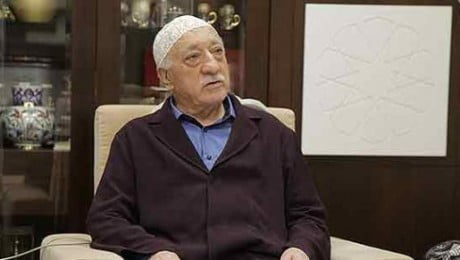Keyword: Gulen extradition

Turkish ambassador leads an unrealistic mission: bringing a reclusive Muslim cleric before Turkish courts
Although Turkey immediately blamed Gulen for the coup attempt, it took Ankara nearly six weeks to make a formal request for his extradition — and that was based on earlier alleged crimes, not for his supposed role in the coup.

Biden’s office refutes Turkish minister’s claim that US has proof Gülenists plotted coup
US Vice President Joe Biden’s office refuted a claim made by Bekir Bozdağ, justice minister of Turkey, who said on Thursday night that Biden had confirmed that substantive information on the involvement of US-based Turkish Islamic scholar Fethullah Gülen had been received by the US as part of an extradition request submitted by Ankara this month.

Fethullah Gulen says will return to Turkey if US backs extradition
Calling for an international probe into the accusation, Gulen told ZDF that he would be ready to answer to such an investigation. “If their accusations stand, then I will accept what they want. But they have neither succeeded in showing any concrete proof nor given an answer to my suggestion. Therefore, these are all just mere assertions,” he said.

US Unlikely to ‘Speed Up’ Gulen’s Extradition to Turkey
Turkey has formally requested that the U.S. government extradite Turkish cleric Fethullah Gulen from the state of Pennsylvania where he has lived in self-imposed exile for 17 years. Turkey is pushing for quick extradition, suggesting that U.S.-Turkish relations are at stake. But the burden of proof rests squarely on Ankara, and if it cannot sufficiently prove its accusations against Gulen, the extradition request will be refused.

The Process Behind Turkey’s Proposed Extradition of Fethullah Gülen
By publicly campaigning for Gülen’s immediate extradition—before a formal request had been submitted—Turkish officials reinforced the idea that the United States is somehow protecting Gülen or resisting the extradition process. That is not true. There will be critics of any eventual decision, just as there are critics of the delay in reaching a decision. Whatever the result, both governments should communicate the decision with consideration for the long-term relationship and should operate on the assumption that the other is acting in good faith.

Fethullah Gulen ‘very confident’ Turkey extradition from US will fail
Alp Aslandogan, president of the New York-based Alliance for Shared Values (AFSV), said Gulen believes the Turkish authorities will not be able to produce concrete evidence to link him to the attempted coup in Turkey last month because that link [to the coup] is false… “So if something is not true, how can they prove it?’ Aslandogan told Middle East Eye in a telephone interview.

US Cannot ‘Suspend’ Constitution for Gulen Extradition – Ex-Prosecutor
The US government cannot violate the country’s Constitution by detaining and extraditing Islamic cleric Fethullah Gulen without probable cause simply to appease Turkey, former US Assistant States Attorney Nick Akerman told Sputnik.

India must understand Erdogan’s ideological motives for seeking extradition of Gülenists
Since its inception in India, Hizmet is known for its peace activism, interfaith dialogue and counter-extremism. Operating in the country through interfaith dialogue centres, educational institutions and cultural associations, it is articulating an evolving narrative of peace, pluralism and non-violence based on the spiritual ideas and principles of Gülen’s progressive and dialogic narrative of Sufism, as this research paper also elaborates.

The US Should Not Extradite Fethullah Gülen, To A Paranoid Turkish Government
It should be common sense to say that Gulen should not be handed over to a paranoid state, which cannot handle its own affairs. Fethullah Gulen himself has done what others also have, which is to suggest that Erdogan himself facilitated “the coup” in order for him to introduce his new phase of order over the country, becoming a dictator under NATO protection.

Al Arabiya: Gulen confident US will not extradite him
In an exclusive interview with Al Arabiya News Channel, Turkish cleric Fethullah Gulen said he was confident that the United States will not extradite him. “The United States has a reputation in the world as a country that upholds the rule of law. So I trust they will follow the proper procedures,” Gulen told Al Arabiya’s New York Bureau Chief Talal al-Haj.

Turkish evidence for Gulen extradition pre-dates coup attempt
Turkey’s request for U.S. extradition of self-exiled cleric Fethullah Gulen refers only to his alleged activities before last month’s failed coup attempt, for which the Turks have not yet provided any evidence of his involvement, a senior administration official said.





















